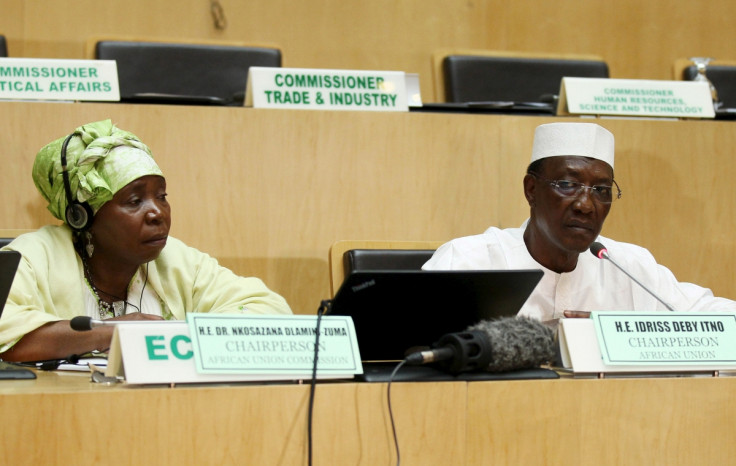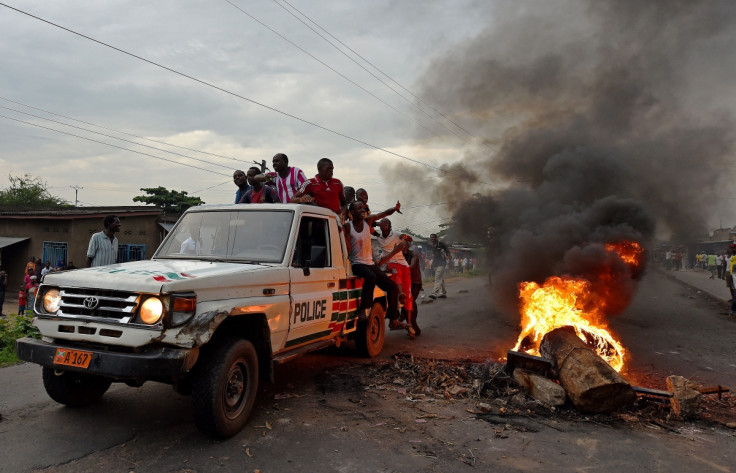African Union Summit: Conflicts plaguing the continent high on the agenda

IBTimes UK looks at the various items on the agenda that were discussed during the 26th Ordinary Summit of the Heads of State and Government of the African Union (AU) in Addis Ababa, which was scheduled for two days and ended yesterday (31 January 2016).
AU's new Chadian chairman
Chad's President Idriss Deby took over the post of AU chairman on Saturday (30 January), replacing Zimbabwean President Robert Mugabe, who had held the role for a year. In his speech, Deby said this new responsibility was "heavy and fraught with challenges". He told fellow leaders at the 54-member bloc's headquarters in Ethiopia that conflicts across the continent had to stop.
"Everything that we are doing now will be in vain and without purpose if we allow Africa to go through these perpetual crises: South Sudan, Libya, Somalia, Burundi, the Sahel, the Lake Chad basin," he said. "Through diplomacy or by force... we must put an end to these tragedies of our time. We cannot make progress and talk of development if part of our body is sick. We should be the main actors in the search for solution to Africa's crises."
The one-year presidency rotates between different regions of the continent. Meanwhile, all 15 members of the AU's Peace and Security Council were re-elected. Southern Africa, Central Africa and East Africa are each allocated three seats while West Africa has four seats and North Africa has two.

Libya: Fighting terrorism
The summit took place two weeks after at least 25 people, including 18 Westerners, were killed when four attackers from al-Qaeda's West African affiliate launched a bloody assault on a hotel and a café in the capital of Burkina Faso, Ouagadougou. Along with Boko Haram and Al-Shabab, the leaders discussed the growing influence of Islamic State (Isis), with Gambian President Yahya Jammeh calling on his fellow presidents to work together to counter terrorism in the continent.
The leaders named a taskforce of five heads of state to address the conflict in Libya, where IS is gaining ground. The bloc revived the AU High Level Panel on Libya, which had worked effectively in the past, and appointed Tanzania's former president Jakaya Kikwete as the AU Special Envoy to Libya.
Burundi violence
After debating the ongoing conflict in member state Burundi, the AU leaders dropped their plan to send 5,000 peacekeepers to stop the country from spiralling into anarchy after the strife-torn nation's government declared it too early for a military intervention on its soil.
Ibrahima Fall, AU Special Representative for the Great Lakes Region told diplomats it "was never the intention of the African Union to deploy a mission to Burundi without the consent of Burundian authorities".
AU would not deploy peacekeepers to troubled Burundi unless the government in Bujumbura agrees, the AU special representative for the region told Radio France Internationale yesterday (31 January 2016). Fall, however, said the block was considering sending a "high-level delegation, not to say very high" to Burundi to hold talks with Nkurunziza's government.
Chris McKeon, Africa analyst at Verisk Maplecroft, told IBTimes UK that the AU's decision to back down from intervening in Burundi "is unsurprising" as deploying peacekeepers without Burundi's permission "was never a viable option". "There is little likelihood that the government will accept a peacekeeping force in the near future, especially as government forces are responsible for much of the violence currently taking place," he said.

Withdrawal from ICC
After claiming that he was disappointed by the way cases brought before the International Criminal Court (ICC) were handled, Kenya President Uhuru Kenyatta presented a proposal to develop a roadmap to pull out of the Rome Statute – which the AU adopted without amendments. Kenyatta earlier faced crimes against humanity charges at the ICC, but his case was dropped in March 2015 after ICC prosecutor Fatou Bensouda withdrew the charges against him due lack of sufficient evidence.
The Kenyan told fellow heads of state that he and Deputy President William Ruto had been subjected to "cases built with weak investigations and pursued with politicised zeal. We refuse to be carried along in a vehicle that has strayed off-course to the detriment of our sovereignty, security and dignity as Africans," Kenyatta said.
Agenda 2063
While this year's theme was "African Year of Human Rights with particular focus on the Rights of Women", the AU Commission chairperson, Nkosazana Dlamini Zuma, reaffirmed the AU's commitment to the implementation of 'Agenda 2063', the bloc's strategic framework for the socio-economic transformation of the continent over the next 50 years. The Agenda 2016 outlines plans for free movement of people, the Commodities strategy and the Pan African Integrated High speed Rail network.
"We are clear on the priorities of Agenda 2063, investing in our people, especially youth and women, in agricultural modernisation and agro-businesses, in manufacturing and industrialisation, the development of our infrastructure, and democracy and developmental governance, and silencing the guns," Zuma said.
Souyth African President Jacob Zuma said he was pleased with the AU summit's outcome.
© Copyright IBTimes 2025. All rights reserved.





















